

Vision
The Department of Pediatrics of the University of the Philippines Manila –Philippine General Hospital will be known as a:
- Leader in innovative teaching in Pediatrics in undergraduate and postgraduate levels
- Center for excellence in general pediatrics and subspecialty services
- Hub or collaborative, interdisciplinary research addressing the country’s health issues and concerns
- Model of efficiency and transparency in governance
. . . accountable to God and the nation.
Mission
We shall develop a core of well-rounded pediatric specialists who are:
- Innovative teachers outstanding in learner-centered programs that are community-oriented, nationally-relevant and globally-recognized;
- Astute clinicians delivering comprehensive healthcare services, employing appropriate technology, tempered with compassion, relevance and sensitivity to socio-cultural dimensions;
- Outstanding researchers with the highest standard of investigative skills and cited in both national and international scientific publications;
- Well-rounded professionals with integrity, reverence for God, and care for humanity.
Goals of the Department for Key Result Area
TrainingProduce competent graduates with a strong foundation in pediatrics through relevant and responsive undergraduate and postgraduate curricula, demonstrating proper medical and professional ethics
ServiceDeliver quality patient services with optimal patient safety and acceptable rate of hospital-related infections
ResearchGenerate original researches published in peer-reviewed national and international journals aligned with aligned with the university research agenda (health technology development, health financing, health service development, socio-environmental health concerns)
Governance- Exhibit efficiency and transparency in the fund generation, utilization, mobilization, accounting, and donor acknowledgement.
- Attain a sustainable human resource management in recruitment, development, placement, recognition, retention, and succession of highly qualified faculty and support staff.
- Deliver an effective infrastructure management (building maintenance and reliable internet connectivity) and equipment management (procurement and maintenance) for optimization of services in a conducive environment
Department History
The Department of Pediatrics takes pride in being the leader in pediatric education, both for the undergraduates and postgraduates. Although starting as one of the original eight departments of instruction in the Philippine Medical School, the forerunner of the the UP College of Medicine, which opened on June 10, 1907, it was only in September 1915 when Pediatrics fully functioned independently of the Department of Internal Medicine, with Dr. Jose Albert as its head until his death in 1946. Ward 11 with a 61-bed capacity was established for the purpose of providing the clinical instruction in the field of pediatrics. Academic programs were strengthened with the clinical clerkship and compulsory internship programs established in 1923.
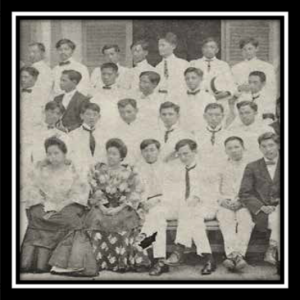
UP Medical Students, circa 1907
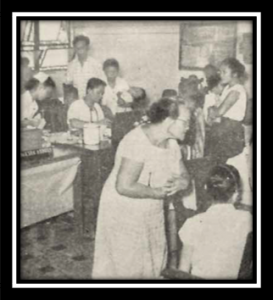
Humble Beginnings of OPD clinics, circa 1950
As the Department continued to trailblaze the path of academic leadership in the field of pediatrics, the adaption of innovative teaching strategies, the provision of relevant continuing education courses, the development of subspecialty disciplines and programs, and the institutionalization of research endeavors became the natural courses of action taken. To date, the Department, which has a roster of 92 faculty members, four of whom hold the position of Professor Emeritus, offers training programs in all 17 recognized pediatric subspecialties, the only center that has achieved this feat in the country. The Department is also the only institution offering fellowship programs in Clinical Genetics, and Emergency Pediatrics, and Endocrinology and Metabolism; and the first to start pediatric subspecialty programs in Adolescent Medicine, Allergy and Immunology; Ambulatory Pediatrics; Developmental and Behavioral Pediatrics; Gastroenterology, Hepatology, and Nutrition; Intensive Care; Newborn Medicine; Nephrology; and Rheumatology, setting the trends for optimal care of patients with these special concerns. The Department maintains its Level IV accreditation status by the Philippine Pediatric Society for its pediatric residency training program since 2010 and all its pediatric subspecialty programs are accredited by the respective subspecialty societies.
The Department also has the pioneering Child Protection Unit. It also offers two graduate programs (MSc in Clinical Medicine – Child Health and MS Genetic Counseling)
Four-time hailed by the Philippine General Hospital as the Most Outstanding Department during the term of the late Prof. Luis Mabilangan (1974–1980), and two-time awarded by the UP College of Medicine the coveted Silver Cup for being the Most Outstanding Clinical Science Department under the chairmanship of Prof. Carmelo Alfiler (1999–2000) and Prof. Juliet Sio Aguilar (2016–2017), the Department of Pediatrics will continue to tirelessly seek ways to advance its mission of delivering quality pediatric education and serving the underserved with competence, dedication, and compassion.
Programs Offered
Leader in Pediatric Medicine in the country with a full complement of 17 pediatric subspecialty training programs:
- Adolescent Medicine
- Allergology / Immunology
- Ambulatory Pediatrics
- Cardiology
- Developmental and Behavioral Pediatrics
- Emergency Pediatrics
- Endocrinology / Metabolism
- Gastroenterology, Hepatology and Nutrition
- Clinical and Metabolic Genetics
- Hematology / Oncology
- Infectious and Tropical Diseases
- Intensive Care
- Newborn Medicine
- Nephrology
- Neurology
- Pulmonology
- Rheumatology
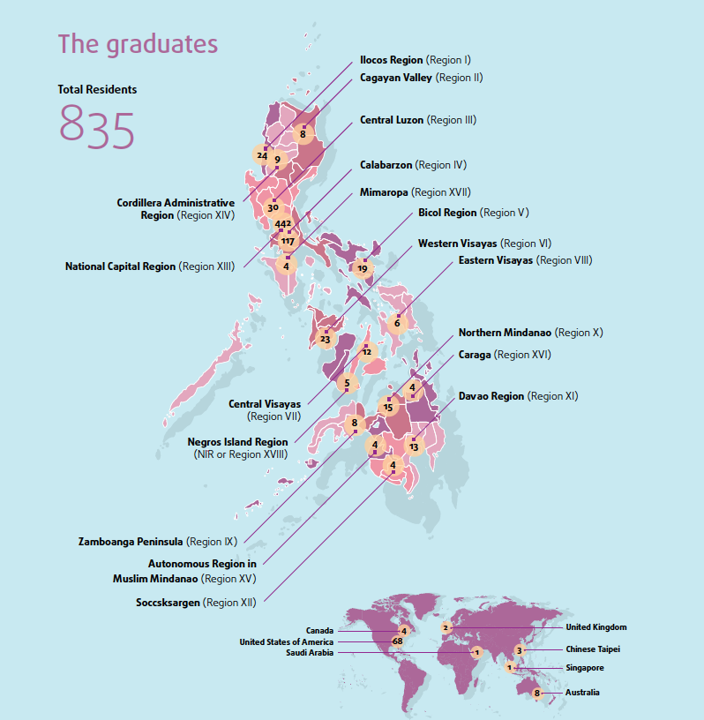
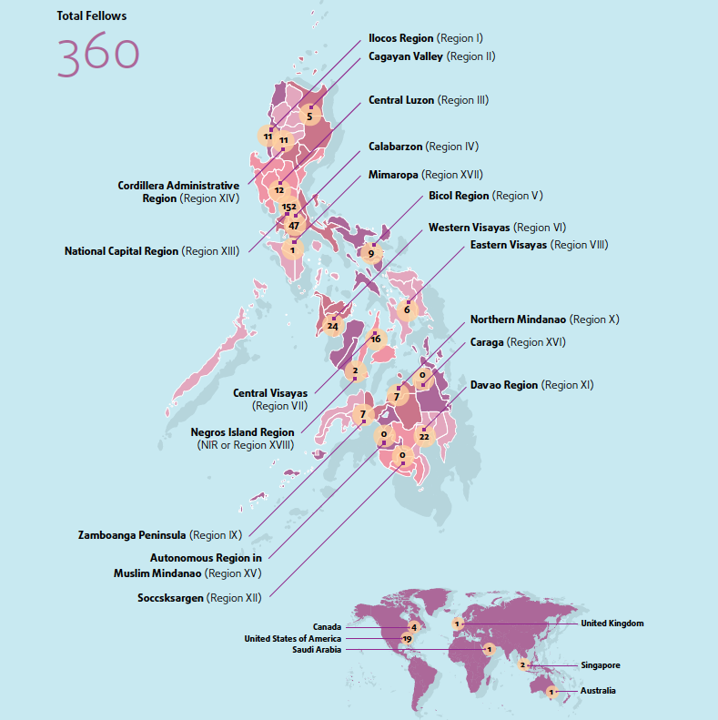
ADOLESCENT MEDICINE
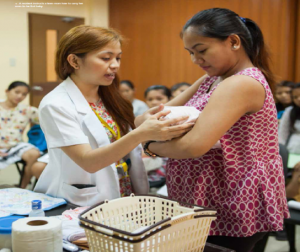
- 1st of its subspecialty program in the country
- Recognizes the unique needs and issues of the vulnerable adolescent group and utilizes a non-judgmental and holistic approach to care
- Advocacy programs include Comprehensive Adolescent Pregnancy (“Teen Mom” Program), transition program for teens with chronic Illness moving to adult healthcare (Teen Endo Clinic and Youth with Developmental Disabilities, Teen Renal Clinic)
- Routine referral to the Section of all adolescent patients.
ALLERGOLOGY AND IMMUNOLOGY

- Conjoint program with Adult Medicine
- Established Drug Reaction Surveillance Program
- Comprehensive Asthma Management
- Development of technology to process local food and airborne allergens, providing allergen extracts for allergy skin prick testing and immunotherapy.
AMBULATORY PEDIATRICS

- Clinical and community-oriented course dealing with approaches to total healthcare of non-hospitalized patients
- Academic ambulatory pediatrics – imbedded program of Masters in Health Professional Education
- Priority child advocacy targets: homeless, mentally disabled, neglected and abandoned, youth, children in armed conflict, drug abusers, sexually and physically abused.
CARDILOGY
- One of only two of its training programs in the country
- Major strength lies in its being a referral center for children with congenital and acquired heart diseases
- Major service programs include echocardiography (transthoracic, transesophageal, fetal), diagnostic and interventional cardiac catheterization, pre- and post-cardiac surgery care.
DEVELOPMENTAL & BEHAVIORAL PEDIATRICS
- 1st of its training program in the country
- Training coverage: typical and atypical childhood behavior and development; assessment of developmental delays, disabilities, and disorders; medical interventions and family support (hub of training for parents, caregivers and community health workers
- Serves patients with ASD, MR, CP, GDD, ADHD including transition clinics for youth with disability and high-risk follow up clinics.
EMERGENCY PEDIATRICS
- 1st and only training program in the country, started in 2014 and boasts of 2 graduates so far
- Systematized care in the emergency room, raising the standards of care that will be comparable to internationally acceptable standards – protocols are being developed in coordination with the different subspecialties.
ENDOCRINOLOGY & METABOLISM
- Program established in 1989 served as the training ground for most endocrinologists in the country (1st and only accredited program)
- Major advocacies: Annual diabetes camps, annual pediatric endocrine lay fora for DM and CAH, provision of funds for diagnosis and treatment
- Specific clinics for Down Syndrome, transition clinic for DM, thyroid disorders and CAH
- Close collaboration with the Institute of Human Genetics of the National Institutes of Health for the metabolic disorders.
GASTROENTEROLOGY, HEPATOLOGY & NUTRITION
- Pioneer in the subspecialty in the country which trained 26 of the 39 local subspecialists
- Revolutionized management of patients with neonatal cholestasis, chronic liver diseases, gut disorders including IBD, nutritional disorders.
GENETICS
- 1st and only one of its training program in the country
- Set the scenario for understanding genetic conditions and advocates for the rights of these individuals with clinical genetic services for dysmorphology and metabolic diseases and ERT for patients with Pompe Disease, Hunter Syndrome, Hurler Syndrome, Gaucher Disease and pamidronate infusion for OI
- Instrumental in passing the Universal Newborn Screening Law and the Rare Disease Bill
- Strong Masters program in Genetic Counseling.
HEMATOLOGY & ONCOLOGY
- Among the earliest established pediatric disciplines in the country because of its earliest faculty in 1939 (an Austrian HO specialist)
- Number one referral center for benign and malignant cases in HO
- With a separate HO ward and available government funds, prospects for cure possible for treatable conditions like ALL
- Online discussion on difficult cases with St. Jude’s Children’s Hospital in Memphis, Tennessee
INFECTIOUS & TROPICAL PEDIATRICS
- Infection Control
- Antimicrobial Resistance and Sensitivity Surveillance
- Proficiency in the management of pediatric TB, HIV/AIDS in children and the prevention of mother-to-child transmission, treatment and prevention of hospital-acquired multi-drug resistant organisms
- Research and Publications.
INTENSIVE CARE
- Pioneer in the subspecialty in the country
- Training program provides a balance of didactics and management of clinical cases covering trauma cases, severe pneumonias, other infectious diseases, post-cardiac surgery cases, post-neurosurgical cases, other surgical post-op cases.
NEPHROLOGY
- Over 30 years of training and service experience and the training ground of top nephrologists in the country
- Training program focusing on the diagnosis and management of common and uncommon diseases of the kidneys and urinary tract with strong supervision by renal physiologists with proficiency in performing renal biopsies, implanting PD catheters, with surgical background on kidney transplantation and vascular access for dialysis.
NEUROLOGY
- Established first as a program of the Adult Neurology until 1992 when it became a separate pediatric training program with a US-trained epileptologist
- Major strengths in wide array of cases (CNS infections, congenital malformations, brain tumors, epilepsy) and training in diagnostics (EEG, neurophysiology, UTZ).
NEWBORN MEDICINE
- The oldest subspecialty training program in the country handling over 6,000 newborns delivered annually
- Blends simple newborn care with advanced technologies – strong advocate for BF, KMC, human milk banking, hand hygiene.
NEWBORN MEDICINE
- Recipient of locally produced ventilators, OstreaVent, conceptualized by a visiting professor from Wayne State University (Dr. Enrique Ostrea, Jr.) and partnered with UP College of Engineering, Department of Science and Technology, UP College of Arts and Sciences for its design, supported by over a decade of research, both animal and clinical studies.
PULMONOLOGY
- Training program started in 1992 with strengths in managing common and rare pulmonary cases
- Joint program with Allergy for the management of asthma cases
- Pulmonary Diagnostic tests: PFT, exercise challenge test, thoracentesis, bronchoscopy
- Pulmonary evaluation and risk assessment for preoperative patients.
RHEUMATOLOGY
- Pioneering program in the country, offered initially in collaboration with Adult Medicine but now a separate program
- Allowed for a comprehensive understanding of rheumatologic conditions in the Philippines.
Graduate Programs
MS Genetic Counselling- Two-year program geared towards preparing students to become competent genetic counselors in answer to the growing need for disease awareness and psychosocial support for patients and families with genetic disorders
- Kindly click here to download the MS Genetic Counselling PDF.
- Two-year program designed to develop pediatricians into health managers with deeper knowledge and extensive skills in pediatric medicine
- The prgram includes the development of curricular and instructional designs, research protocol development and conduct of researches, and enhancement of critical facilities related to child health care, with courses coordinated with the National Teacher Training Center for Health Professionals and the Clinical Epidemiology Unit.
- The Department of Pediatrics is committed to the goal of providing complete undergraduate and postgraduate education in pediatric medicine. This goal will be in congruence with the national goal of providing for the holistic health of Filipino children and with the university goal of producing a well-rounded medical practitioner and pediatric specialist
Faculty Members
| Chair | Lorna R. Abad, M.Sc. |
| Chair Assistant | for update Academics and Postgraduate Training Edilberto B. Garcia, Jr. Patient Services Ma. Liza Antoinette M. Gonzales, M.D., M.Sc. (until June 24, 2018); Ma. Esterlita V. Uy, M.D. (from June 25, 2018) Research |
| Training Committee Chairs | Anna T. Ong-Lim, M.D. Residency Training Program Benilda C. Sanchez-Gan, M.D. Fellowship Training Programs |
CONSULTANT STAFF (as of August 2018)
GENERAL PEDIATRICS- Cecilia D. Alinea, M.D., M.H.P.Ed. (CHIEF)
- Gracia V. Agrasada, M.D., Ph.D.
- Ediiberto G. Garcia, Jr., M.D., M.P.H.
- Anna Ma. Lena L. Lopez, M.D. (Infectious Disease)
- Catherine Lynn T. Silao, M.D., Ph.D. (Genetics)
- Leah Patricia M. Arceo-Plucena, M.D. (Cardiology)
- Sally Jane G. Velasco-Aro, M.D. (Infectious Disease)
- Andrea Orel S. Valle, M.D. (Cardiology)
- Justine Iris C. Yap, M.D. (Cardiology)
10. Emma A. Llanto, M.D. (CHIEF)
11. Vanessa F. Torres-Ticzon, M.D.
ALLERGY AND IMMUNOLOGY
12. Marysia Stella T. Recto, M.D. (CHIEF)
13. Mary Anne R. Castor, M.D.
14. Roxanne J. Casis-Hao, M.D.
15. Aimee Lou M. Nano, M.D.
AMBULATORY PEDIATRICS
16. Benjamin Sablan, Jr., M.D., MSMD (CHIEF)
17. Bernadette J. Madrid, M.D.
18. Merle P. Tan, M.D.
19. Angelica Cecilia H. Tomas, M.D.
20. Melissa P. Ramboanga, M.D.
CARDIOLOGY
21. Edison T. Ty, M.D. (CHIEF)
22. Olympia Q. Malanyaon, M.D.
23. Jose Jonas D. del Rosario, M.D.
24. Ma. Concepcion C. Sison, M.D.
25. Cecilienne S. Acosta, M.D.
26. Dexter Eugene D. Cheng, M.D.
DEVELOPMENTAL AND BEHAVIORAL PEDIATRICS
27. Alexis Socorro L. Reyes, M.D. (CHIEF)
28. Stella G. Manalo, M.D.
29. Rita Grace R. Villadolid, M.D.
30. Ma. Anna Lourdes A. Moral, M.D.
31. Maria Isabel O. Quilendrino, M.D.
32. Victoria Dominique C. Ang-Nolasco, M.D.
EMERGENCY PEDIATRICS
33. Jonathan S. Cu, M.D. (CHIEF)
34. Ma. Victoria C. Ribaya, M.D.
35. Fides Roxanne M. Castor, M.D.
ENDOCRINOLOGY AND METABOLISM
36. Sioksoan C. Cua, M.D. (CHIEF)
37. Lorna R. Abad, M.D., M.Sc.
38. Sylvia C. Estrada, M.D.
39. Caridad M. Santos, M.D.
GASTROENTEROLOGY, HEPATOLOGY, AND NUTRITION
40. Jossie M. Rogacion, M.D., M.Sc. (CHIEF)
41. Juliet O. Sio-Aguilar, M.D., M.Sc.
42. Germana V. Gregorio, M.D., Ph.D.
43. Novette Regina M. Lagunzad, M.D.
GENETICS
44. Eva Maria C. Cutiongco-de la Paz, M.D. (CHIEF)
45. Carmencita D. Padilla, M.D., MAHPA
46. Ma. Melanie Liberty B. Alcausin, M.D.
47. Mary Ann R. Abacan, M.D.
48. Mary Anne D. Chiong, M.D., M.S.
49. Mercy Y. Laurino, PhD.
HEMATOLOGY AND ONCOLOGY
50. Ana Patricia A. Alcasabas, M.D. (CHIEF)
51. Pamela D. Fajardo, M.D.
52. Jochrys I. Estanislao, M.D.
INFECTIOUS AND TROPICAL DISEASE
53. Anna T. Ong-Lim, M.D. (CHIEF)
54. Salvacion R. Gatchalian, M.D.
55. Ma. Liza Antoinette M. Gonzales, M.D., M.Sc
56. Marimel R. Pagcatipunan, M.D.
57. Ceclia Nelia C. Maramba-Lazarte, M.D., M.S.
58. Carmina A. de los Reyes, M.D.
INTENSIVE CARE
59. Herbert Michael G. Uy, M.D. (CHIEF)
60. Hannah Vera M. Villamor, M.D.
61. Karen E. Bambo, M.D.
62. Charissa Sharmaine E. Cua, M.D.
63. Edward Vincent S. Faustino, M.D. (Visiting Professor, Yale University)
NEPHROLOGY
64. Dolores D. Bonzon, M.D. (CHIEF)
65. Francisco E. Anacleto, Jr. M.D.
66. Eric Emmanuel T. Aragon, M.D.
67. Lourdes Paula R. Resontoc, M.D.
NEUROLOGY
68. Benilda C. Sanchez-Gan, M.D. (CHIEF)
69. Marissa B. Lukban, M.D.
70. Marilyn A. Tan, M.D.
71. Cheryl Anne P. Lubaton-Sacro, M.D.
72. Loudella V. Calotes-Castillo, M.D.
73. Martha L. Bolaños, M.D.
74. Rhea Angela M. Salonga-Quimpo, M.D.
NEWBORN MEDICINE
75. Resti Ma. Bautista, M.D. (CHIEF)
76. Jacinto Blas V. Mantaring III, M.D., M.Sc.
77. Ma. Esterlita V. Uy, M.D.
78. Aurora Gloria I. Libadia, M.D.
79. Kathlynne Anne C. Abat-Senen, M.D.
80. Fay S. de Ocampo, M.D.
PULMONOLOGY
81. Alexander O. Tuazon, M.D., M.S. (CHIEF)
82. Kevin L. Bautista, M.D.
83. Roslyn Marie K. Dychiao, M.D.
84. Kristine H. Tanega-Aliling, M.D.
85. Arnel T. Suratos, M.D.
86. Cristina H. Lozada, M.D.
RHEUMATOLOGY
87. Leonila F. Dans, M.D., M.Sc.
88. Cherica A. Tee, M.D. (OIC)
PROFESSOR EMERITUS
89. Carmelita F. Domingo, M.D., M.Sc.
90. Ramon L. Arcadio, M.D., M.H.P.Ed.
91. Carmelo A. Alfiler, M.D.
92. Lulu C. Bravo, M.D.
Facilities
- Pediatric Charity Wards (Wards 9 and 11)
- Hematology Oncology Ward
- Pediatric Pay Wards
- Pediatric Emergency Room
-
Pediatric Outpatient Clinics
- General Pediatrics
- Subspecialty Clinics (Premature and High-risk Baby Clinic, Adolescent Clinic, Allergy Clinic, Cancer Clinic, Cardiology Clinic, Clinical Genetics, Developmental and Behavioral Clinic, Endocrine and Metabolic Clinic, General Neurology Clinic, GI and Nutrition Clinic, Hematology Clinic, Infectious Disease Clinic, Pulmonary Clinic, Renal Clinic, Rheumatology Clinic)
- Pediatric Intensive Care Unit
- Neonatal Intensive Care Unit
- Kangaroo Mother Care Unit
- School for the Chronically Ill Children (Silahis ng Kalusugan)
Services
- Inpatient Management Services
- Outpatient Consultations
- Human Milk Bank and Lactation Unit
- Lipat Kalinga Transitioning Patient Care
-
Diagnostic Procedures
- Allergen Skin Testing
- Cranial Ultrasonography
- Developmental Screening and Assessment
- Echocardiography
- Percutaneosu Kidney Biopsy and Peritoneal Dialysis
- Percutaneous Liver Biopsy
- Pulmonary Function Test
- Upper GI Endoscopy and Colonoscopy
-
Treatment Programs
- Enzyme Replacement Therapy for Genetic Disorders
- Non-invasive Interventional Cardiology
Research
The Department of Pediatrics envisions itself as a hub for collaborative, interdisciplinary research addressing the country’s health issues and concerns. It has created a solid research agenda in line with the thrust of the University to promote a culture of research among its constituents. The past years have been fruitful, with the department seeing a steady rise in the number of research outputs from the consultants, fellows, and residents through the years. Several researches, particularly involving the faculty, have also been published in both local and international publications, as well as presented in various conferences and research forums in the country and abroad.
This year, stricter and earlier research deadlines were imposed on all residents in order to provide ample time for the mentors and technical advisers to give constructive comments and suggestions. The Department also held research writeshops in June 2017. The writeshops were one-day activities, categorized by the trainee year level, in which the residents were focused on specific tasks to meet their research requirements. In attendance were the Assistant Chair for Research, the research consultant assigned for each batch, and the Chief Resident. The Department also hired a research assistant and a statistician to help the pediatric residents and fellows in their research requirements. The Department hopes that these changes will help increase the number of research publications among residents and fellows.

To further assist its constituents in such endeavors, the Department has created a Research Manual that outlines the salient information needed in the conduct of researches including the guidelines and procedures for approval of research protocol, from submission for technical and ethical review to certification by the University of the Philippines Manila Review Ethics Board (UPMREB) and the Expanded Hospital Research Office (EHRO), among others.
The Department of Pediatrics annually holds the Pediatric Research Week usually in the last week of September. Various categories of the week-long research contest included oral and poster research papers and case reports for fellows and residents.
The Department of Pediatrics residents and fellows also regularly participates in the UP-PGH Annual Research For a. In 2017, the department garnered awards in the systematic review, experimental and case reports categories.
Contact Information
Department of Pediatrics
G/F Philippine General Hospital
Taft Avenue, Manila 1000 Philippines
Tel. No.: (+632) 554-8400 Local: 2100/2101/2107
Direct Line: (+632) 554-8469
E-mail: pgh.pedia.chiefresident@gmail.com
Faculty Directory
| # | Faculty Name |
|---|